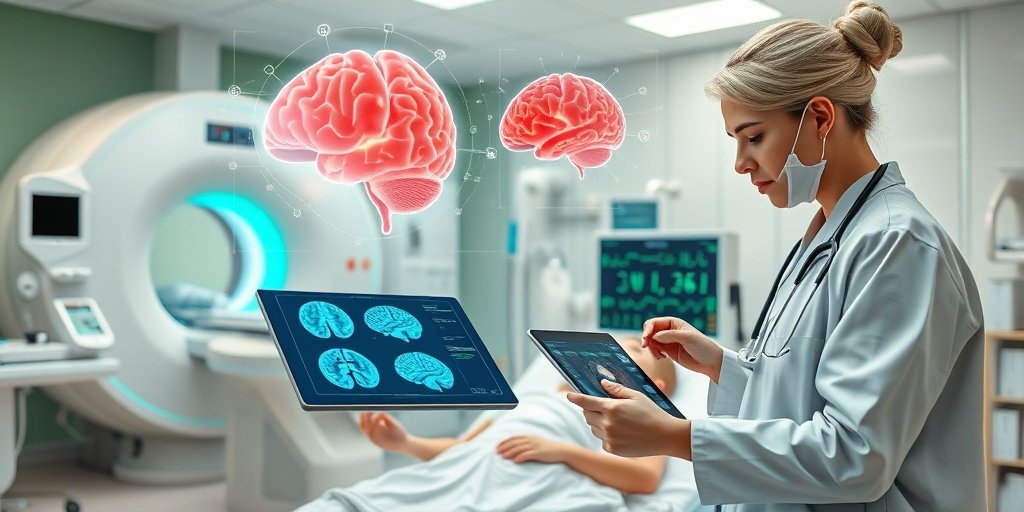⚡ Quick Summary
This article explores the integration of Artificial Intelligence (AI) and radiogenomics in the diagnosis and treatment of pediatric CNS neoplasms. The advancements in molecular profiling and imaging technologies promise to enhance personalized treatment strategies for young patients.
🔍 Key Details
- 📊 Focus: Pediatric CNS neoplasms
- 🧬 Technologies: DNA methylation profiling, Next Generation Sequencing
- 🖼️ Methodology: Radiogenomics correlating imaging features with genetic profiles
- 🤖 AI Techniques: Machine learning and deep learning for image analysis
- 📅 Publication: Neuroimaging Clinics of North America, 2026
🔑 Key Takeaways
- 🧬 Molecular alterations are crucial for accurate diagnosis in pediatric tumors.
- 🔬 DNA methylation profiling and Next Generation Sequencing refine tumor subtypes.
- 🖼️ Radiogenomics allows for non-invasive tumor characterization, reducing biopsy risks.
- 🤖 AI enhances image analysis, segmentation, and prediction of molecular markers.
- 💡 Personalized treatment strategies are supported by these technological advancements.
- ⚠️ Challenges include data variability and ethical concerns in AI applications.
- 🌟 Potential to revolutionize pediatric neuro-oncology practices.

📚 Background
The landscape of pediatric oncology is rapidly evolving, particularly with the introduction of the 5th edition of the WHO CNS tumor classification in 2021. This classification emphasizes the importance of molecular alterations alongside traditional histology, paving the way for more precise diagnoses and targeted therapies. As pediatric tumors often present unique challenges, integrating advanced technologies is essential for improving patient outcomes.
🗒️ Study
The study highlights the role of AI and radiogenomics in pediatric CNS neoplasms, focusing on how these technologies can enhance the understanding of tumor biology without the need for invasive procedures. By correlating imaging features with genetic profiles, researchers aim to develop a comprehensive approach to tumor characterization that is particularly beneficial for young patients.
📈 Results
The integration of AI in image analysis has shown promising results, with machine learning and deep learning techniques significantly improving the accuracy of tumor characterization. These advancements not only facilitate better diagnosis but also support the prediction of molecular markers, which are critical for tailoring treatment plans to individual patients.
🌍 Impact and Implications
The implications of this research are profound. By leveraging AI and radiogenomics, healthcare providers can offer more personalized and effective treatment options for pediatric patients with CNS neoplasms. This approach not only enhances diagnostic accuracy but also minimizes the risks associated with traditional biopsy methods, ultimately leading to improved patient care and outcomes.
🔮 Conclusion
The study underscores the transformative potential of AI and radiogenomics in pediatric neuro-oncology. As these technologies continue to evolve, they promise to deliver more precise, non-invasive diagnostic tools and treatment strategies, heralding a new era in the management of pediatric CNS neoplasms. Ongoing research and collaboration in this field are essential to fully realize these advancements.
💬 Your comments
What are your thoughts on the integration of AI and radiogenomics in pediatric oncology? We would love to hear your insights! 💬 Share your comments below or connect with us on social media:
Artificial Intelligence and Radiogenomics for Pediatric CNS Neoplasms.
Abstract
The 5th edition of the WHO CNS tumor classification (2021) emphasizes molecular alterations, especially in pediatric tumors, integrating histology with molecular profiling for precise diagnosis. Advances like DNA methylation profiling and Next Generation Sequencing have refined tumor subtypes, influencing targeted therapies. Radiogenomics correlates imaging features with genetic profiles, enabling non-invasive tumor characterization, crucial in pediatric cases where biopsies are risky. Artificial intelligence, including machine learning and deep learning, enhances image analysis, segmentation, and prediction of molecular markers, supporting personalized treatment. Despite challenges like data variability and ethical concerns, these technologies promise to revolutionize pediatric neuro-oncology.
Author: [‘Tortora M’, ‘Ayres A’, ‘Ferraciolli SF’]
Journal: Neuroimaging Clin N Am
Citation: Tortora M, et al. Artificial Intelligence and Radiogenomics for Pediatric CNS Neoplasms. Artificial Intelligence and Radiogenomics for Pediatric CNS Neoplasms. 2026; 36:185-196. doi: 10.1016/j.nic.2025.09.003